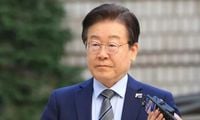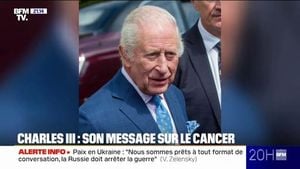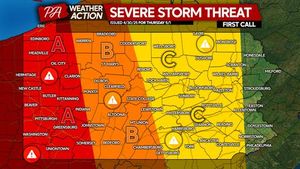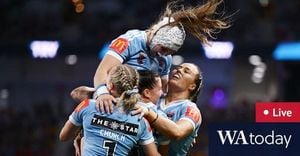On May 1, 2025, the South Korean Supreme Court delivered a significant ruling concerning Lee Jae-myung, the Democratic Party's presidential candidate, by sending back his case regarding violations of the Public Official Election Act for a review of a guilty verdict. This decision has raised questions about Lee's candidacy as he continues to navigate the complexities of legal challenges amid a crucial election period.
The Supreme Court, led by Chief Justice Cho Hee-dae, determined that Lee's comments regarding a golf outing with the late Kim Moon-ki, former head of Seongnam City Development Corporation, and his assertions about the Ministry of Land, Infrastructure and Transport's alleged coercion of Seongnam City were false statements under Article 250, Paragraph 1 of the Public Official Election Act. "There was no fact that the Ministry of Land, Infrastructure and Transport listened to Seongnam City's unreasonable demands and pressured them," the court stated, emphasizing that Lee's remarks contradicted the truth.
Lee Jae-myung's legal troubles stem from accusations made during his 2021 presidential campaign, where he allegedly spread false information regarding the zoning privileges related to the Korea Food Research Institute site in Seongnam's Baekhyeon-dong area. Initially, a first trial court sentenced him to one year in prison, suspended for two years, but the second trial court acquitted him, stating that his comments were merely expressions of opinion.
However, with the Supreme Court's recent ruling, Lee now faces a significant legal risk as he prepares for the upcoming presidential election. The court's decision came approximately five months ahead of the standard six-month timeline for election crime cases, indicating a deliberate effort to clarify Lee's legal standing before voters head to the polls.
Political analysts are closely monitoring the implications of this ruling on Lee's candidacy. If he is elected president, the ongoing legal proceedings could lead to further controversy regarding his eligibility, particularly given Article 84 of the Constitution, which states that a sitting president cannot be prosecuted unless for insurrection or treason. However, the Supreme Court did not address this aspect in its ruling.
Lee's legal challenges have sparked a heated political debate. Following the ruling, Democratic Party spokesperson Hwang Jeong-ah expressed strong discontent, claiming that "the Supreme Court is doing politics" and accusing the court of undermining the public's will. Lawmaker Kim Yong-min echoed these sentiments, asserting that the ruling infringed upon the sovereignty of the people.
Conversely, the People Power Party welcomed the Supreme Court's decision, viewing it as a victory for the rule of law. Floor leader Kwon Seong-dong called for Lee to take responsibility for his past actions and resign from his candidacy, asserting that the ruling was a necessary correction to the previous trial's verdict. "This ruling is a victory for common sense and the restoration of the rule of law," he stated.
Lee Jae-myung, addressing the media after the ruling, remarked, "What is most important is that the law reflects the agreement of the people, and ultimately, the people's heart is the most important." He dismissed calls for his resignation as politically motivated, asserting that he would adhere to the will of the electorate.
The Supreme Court's expedited ruling, which arrived nearly two months earlier than expected, has raised eyebrows in both legal and political circles. Chief Justice Cho Hee-dae's influence in accelerating the decision was noted, as he swiftly convened the full bench to address the case promptly. This rapid response has led to speculation that the court aimed to minimize uncertainty surrounding Lee's candidacy during the election period.
As the political landscape shifts in response to this ruling, reactions from both parties reflect the heightened stakes of the upcoming election. The Democratic Party, initially buoyed by Lee's previous acquittal, now faces a challenging narrative as they navigate the implications of the Supreme Court's decision. Meanwhile, the People Power Party is poised to capitalize on this opportunity, framing Lee's legal troubles as a critical issue in the electoral campaign.
Lee's campaign activities continue as he engages with various groups, including a policy agreement ceremony with the Korea Confederation of Trade Unions. He has also announced plans for a regional tour aimed at connecting with voters, emphasizing issues such as extending the retirement age through social consensus and reintroducing the 'Yellow Envelope Act' aimed at protecting striking workers.
As the election date approaches, the implications of the Supreme Court's ruling will likely resonate throughout the campaign, influencing voter perceptions and the overall political climate. While Lee remains a prominent candidate, questions about his legal standing and the potential fallout from ongoing legal proceedings will undoubtedly shape the narrative leading up to the election.

![[속보] 대법 “이재명 ‘백현동 발언’ 명백히 허위”](https://thumbor.evrimagaci.org/OUfB3pRs6-fFYUIq3nOc5C8vXPw=/200x0/tpg%2Fsources%2F17dbb941-2fc5-4cb2-bdc4-a2fa953a6fad.jpeg)



